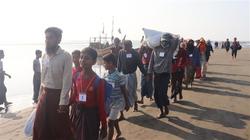 Rohingya Muslims arrested by Myanmar forces have appeared in court in the nation’s capital of Yangon over criminal charges for attempting to flee apartheid-like conditions in Rakhine state.
Rohingya Muslims arrested by Myanmar forces have appeared in court in the nation’s capital of Yangon over criminal charges for attempting to flee apartheid-like conditions in Rakhine state. RNA - The group of nearly 20, including children, who appeared in court on Friday were among 54 people from the Rohingya minority detained on Wednesday on the outskirts of Yangon while trying to escape the country to Malaysia, Reuters reported, citing judge Thida Aye.
“The immigration officer submitted the case because they found no identification cards from these people,” she said as quoted in the report, which noted that some of those ushered in the courtroom were barefoot -- including a small boy that was naked from the waist down – and others clothed in colorful head-scarves.
Meanwhile, appointed defense attorney Nay Myo Zar said the detainees had fled the western state, where hundreds of thousands of minority Rohingya Muslims live under oppressive conditions and have been subjected to rising pressure amid a brutal crackdown by government forces on alleged ethnic rebels.
Myanmar officials claim the army was engaged in a legitimate counter-insurgency campaign against militants who allegedly attacked security posts.
The government further asserts that it is working on a national strategy to shut down refugee camps and that Rohingya would not face movement restrictions if they accepted a so-called national verification card, which many reject, insisting that it labels them foreigners.
According to United Nations investigators, more than 730,000 Rohingya Muslims fled Myanmar to Bangladesh in 2017 to escape what they have described as a military-led crackdown – including massacres and rapes -- carried out with “genocidal intent.”
Meanwhile, nearly 600,000 Rohingya still remain in the country but confined to camps and villages where they are unable to travel freely or access healthcare and education. Moreover, the vast majority of the ethnic minority in the majority Buddhist country lack citizenship.
Army vows prosecution of troops over Rohingya abuses
The development came as Myanmar’s army announced in a Friday statement that it would hold more court-martials over widely reported abuses against Rohingya Muslims after a state-appointed commission confirmed that military officers had committed war crimes against the minority group.
The commission concluded in a report published in January that members of the military forces, along with “multiple actors,” were responsible for war crimes and serious human rights violations during a military-led crackdown against the Muslim community in 2017.
The army further stated in a post on its website Friday it had studied the panel’s report in great detail and was reviewing allegations.
The government-appointed panel blamed Rohingya militants for attacking 30 police posts and “provoking” the crackdown, which it said did not amount to genocide.
The army said it was investigating alleged abuses in two villages: Maung Nu, where residents told the panel as many as 200 Muslims were killed after taking shelter in a single house, and Chut Pyin, where dozens more are alleged to have died.
“The Court of Inquiry will investigate such incidents and the trial of Court-Martial will be followed in accordance with the law and in line with the processes of Military Justice,” said the army statement.
Myanmar is facing genocide charges at the Hague-based International Court of Justice (ICJ) after Gambia, a mainly Muslim West African state, lodged a lawsuit against it last year.
Massacre of 200 of Rohingya Muslims
According to press reports, residents of Maung Nu told state-appointed investigators that government soldiers besieged the village after some militants attacked a nearby security post and stormed a house where many villagers were sheltering, killing as many as 200.
The January report further found that in Chut Pyin, residents said soldiers surrounded the village and used rocket launchers to set fire to houses, shooting people indiscriminately, killing scores.
Troops told local Buddhist elements, who allegedly participated in the destruction, to “systematically destroy the bodies” afterwards, one Buddhist resident testified before the government-backed panel.
“There were so many corpses in Chut Pyin village that when they were burnt, not all could be burnt down to ashes; some were buried, and some dead bodies were pulled apart by wild animals,” the resident was quoted as saying.
Myanmar has vowed to conduct its own investigations of massive abuses against the Rohingya, claiming that international justice mechanisms violate its sovereignty.
847/940